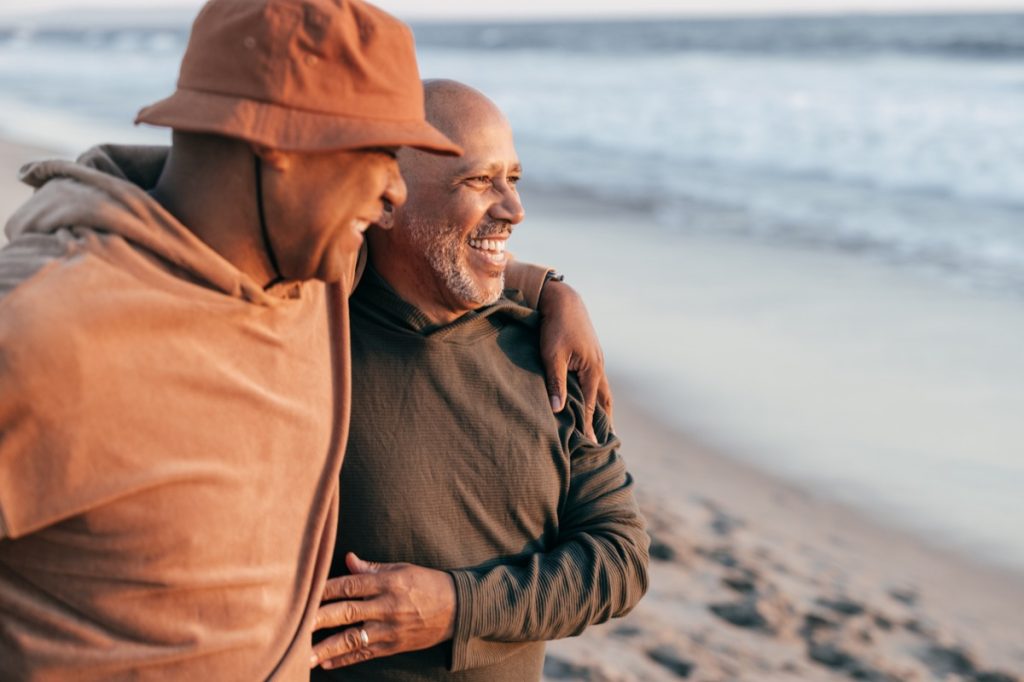What Your Love Language Says About Your Finances, According to a Therapist

By its very definition, someone’s love language can dictate how they approach a relationship. Of course, knowing what yours is, along with your partner’s, can be incredibly helpful in establishing healthy communication habits and finding fulfillment. But the concept can also be beneficial when it comes to self-realization and helping to explain certain patterns—including how someone handles their money. Read on to see what your love language says about your finances, according to a therapist.
READ THIS NEXT: The Top 5 Signs You Found the Love of Your Life, According to Relationship Experts.
Words of Affirmation

No matter what you’re saying, words can carry an especially high value for some people. And according to experts, those who like to exchange verbal compliments or affirmations with their significant other might even consider them more essential than money.
“The type of individual who values this love language may value emotional security over financial security,” David Tzall, PsyD, a licensed psychologist based in Brooklyn, tells Best Life. “Gifts or pricey dinners may not mean a lot to them and, in turn, they may not use money as a way to demonstrate their love to others.” It’s important for a partner to be aware of this so that they don’t associate a lack of gifts with a lack of caring, Tzall explains.
“Additionally, this type may be more comfortable with a lower income as long as they feel loved and valued in the relationship, rather than feeling pressure to provide for their partner financially,” he says.
Quality Time

Whether you’re just getting to know one another or have been together for decades, prioritizing spending time with the one you love can be the most essential part of a relationship for some people. For them, money might play its function as a means of facilitating this.
“Those who fall into this category may value experiences over possessions and may be willing to spend money on creating memories together rather than buying material items,” says Tzall. “Money may be spent on quality time, or it might be viewed as unnecessary as quality time can be free. Experiences such as snuggling or going for a walk together are free but have long-lasting effects on the bond of the couple.”
For more relationship advice delivered straight to your inbox, sign up for our daily newsletter.
Physical Touch

A hug, kiss, or even simply holding hands can mean the most to people who favor physical touch. But while it may seem completely unrelated to finances, experts say craving affection can still shed some light on how they handle their funds.
“Anyone who is guided by this love language can value security and stability, including saving money for future plans,” says Tzall. “They may be willing to make certain financial sacrifices in order to ensure that they have a comfortable home and can provide for their partner in a tangible way.”
Acts of Service

It’s only normal to want to feel supported in a relationship. And for many, actions really can speak louder than words—even within the confines of coupledom. But while doing for others to demonstrate love and care may not always cost anything, it can still tie into their outlook on finances.
“Help equals love for this group,” says Tzall. “The type of individual who values this love language may prioritize practicality and efficiency. As a result, they may save [more] money compared to others and find ways to stretch their budget to make the most of what they have. They may be willing to make financial sacrifices in order to be able to help their partner in tangible ways, such as by taking care of household expenses or by working extra hard to save for a shared goal.”
READ THIS NEXT: 49 Percent of You Have Fallen in Love With Someone You Weren’t Initially Attracted To, New Study Says.
Receiving Gifts

At face value, it may seem as though those who feel the most comforted by thoughtful gifts from their partner would be most guided by thoughts of money or personal finance. But experts say the reality is much deeper than that.
“This group, more than the others, is likely to put a higher priority on money and the need for it,” says Tzall. “But this is not to say that the gift has to be a certain amount. Gifts may be free, such as making a card, or they can be lavish. Gift-giving is what demonstrates the love rather than the amount given.”
However, there are still some caveats. “This may not hold true for everyone, and some may believe that the more they spend equates to the amount they love their partner. They may prioritize spending money on experiences and gifts, and they may also be willing to spend more money on luxuries and on themselves, but this would also depend on their personal values, financial goals, and budget,” he explains.